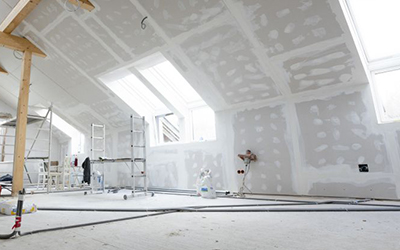
With more people becoming aware of how building materials affect the environment, the building industry is embracing innovative solutions to create more sustainable and eco-friendly living spaces. In Ontario, where residential construction is thriving, homeowners and builders are exploring alternatives to traditional drywall to minimize their ecological footprint. In this blog, we will explore some of the latest innovations in residential drywall, focusing on eco-friendly options and sustainable practices.
Recycled Drywall Materials: Traditional drywall production involves extracting gypsum from mines, which can be energy-intensive and contribute to environmental degradation. A more sustainable alternative consists of using recycled materials. Manufacturers are now producing drywall with recycled gypsum and paper, reducing the demand for virgin resources. It conserves natural resources but also helps divert waste from landfills.
Low VOC (Volatile Organic Compound) Drywall: Indoor air quality is a significant concern for homeowners. Conventional drywall can emit harmful VOCs, which can adversely affect health. To address this issue, eco-friendly drywall options with low or no VOCs are gaining popularity. These products are designed to minimize off-gassing, providing a healthier indoor environment for residents.
Hempcrete Drywall: Hempcrete is an innovative and sustainable building material gaining traction in construction. Combining hemp fibres, lime, and water, hempcrete is carbon-negative and provides excellent insulation properties. Manufacturers are now exploring the incorporation of hempcrete into drywall products, offering a greener alternative for residential construction.
Prefabricated Drywall Systems: Prefabricated or modular construction has become a trend in sustainable building practices. Prefabricated drywall systems are designed off-site, reducing construction waste and promoting efficient material use. These systems also allow for more straightforward deconstruction and recycling at the end of a building’s life cycle, contributing to a more circular economy.
Energy-Efficient Drywall Additives: Innovations in drywall extend beyond the materials themselves. Some manufacturers are developing energy-efficient additives that enhance the thermal performance of drywall. By improving insulation, these additives can lessen the need for heating and cooling systems, which lowers household energy usage.
Waste Reduction Practices: Sustainable drywall installation involves using eco-friendly materials and implementing waste reduction practices. Construction teams can adopt strategies such as precise measurement, modular design, and recycling programs to minimize waste generated during installation.
The need for sustainable building techniques is increasing, and the residential construction industry in Ontario is witnessing a shift towards eco-friendly drywall options and sustainable practices. From recycled materials to innovative additives, these advancements contribute to creating healthier homes while reducing the environmental impact of construction. As homeowners and builders become more conscious of their choices, the future of residential drywall in Ontario looks promising, with a commitment to sustainability and a greener, more environmentally friendly construction industry.





